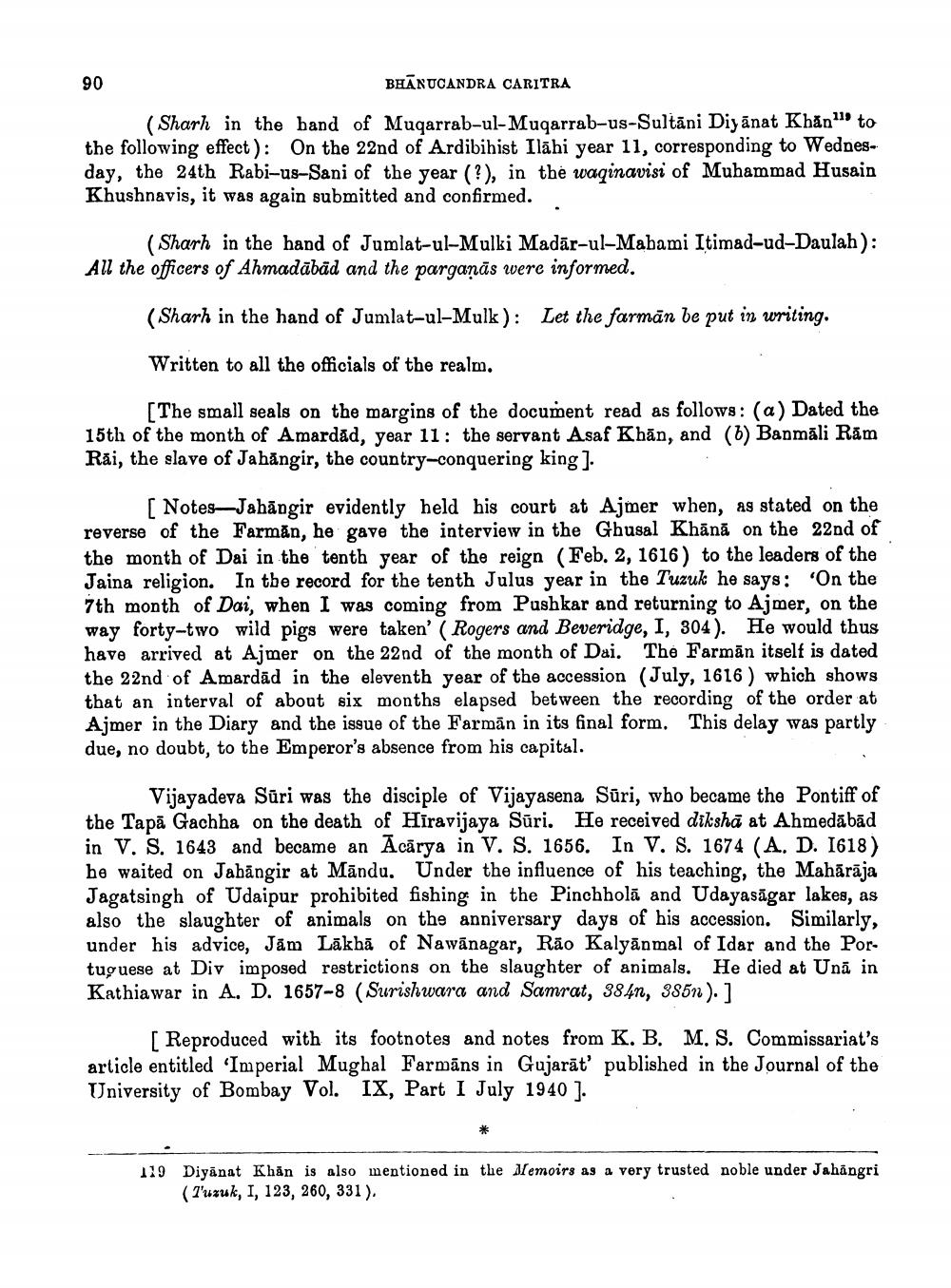________________
90
BHANUCANDRA CARITRA
(Sharh in the hand of Muqarrab-ul-Muqarrab-us-Sultāni Diyanat Khan" to the following effect): On the 22nd of Ardibihist Ilahi year 11, corresponding to Wednes day, the 24th Rabi-us-Sani of the year (?), in the waginavisi of Muhammad Husain Khushnavis, it was again submitted and confirmed.
(Sharh in the hand of Jumlat-ul-Mulki Madar-ul-Mahami Itimad-ud-Daulah): All the officers of Ahmadabad and the pargands were informed.
(Sharh in the hand of Jumlat-ul-Mulk): Let the farman be put in writing.
Written to all the officials of the realm.
[The small seals on the margins of the document read as follows: (a) Dated the 15th of the month of Amardad, year 11: the servant Asaf Khan, and (6) Banmāli Ram Rai, the slave of Jahangir, the country-conquering king].
[Notes Jahangir evidently held his court at Ajmer when, as stated on the reverse of the Farman, he gave the interview in the Ghusal Khänä on the 22nd of the month of Dai in the tenth year of the reign (Feb. 2, 1616) to the leaders of the Jaina religion. In the record for the tenth Julus year in the Tusuk he says: "On the 7th month of Dai, when I was coming from Pushkar and returning to Ajmer, on the way forty-two wild pigs were taken' (Rogers and Beveridge, I, 304). He would thus have arrived at Ajmer on the 22nd of the month of Dai. The Farman itself is dated the 22nd of Amardäd in the eleventh year of the accession (July, 1616) which shows that an interval of about six months elapsed between the recording of the order at Ajmer in the Diary and the issue of the Farman in its final form. This delay was partly due, no doubt, to the Emperor's absence from his capital.
Vijayadeva Sari was the disciple of Vijayasena Sari, who became the Pontiff of the Tapa Gachha on the death of Hiravijaya Süri. He received diksha at Ahmedabad in V. S. 1643 and became an Acarya in V. S. 1656. In V. S. 1674 (A. D. 1618) he waited on Jahangir at Mandu. Under the influence of his teaching, the Mahārāja Jagatsingh of Udaipur prohibited fishing in the Pinchhola and Udayasagar lakes, as also the slaughter of animals on the anniversary days of his accession. Similarly, under his advice, Jam Lakha of Nawanagar, Rão Kalyanmal of Idar and the Portuguese at Div imposed restrictions on the slaughter of animals. He died at Ună in Kathiawar in A. D. 1657-8 (Surishwara and Samrat, 384n, 3851).]
[Reproduced with its footnotes and notes from K. B. M. S. Commissariat's article entitled 'Imperial Mughal Farmans in Gujarat' published in the Journal of the University of Bombay Vol. IX, Part I July 1940].
119 Diyanat Khan is also mentioned in the Memoirs as a very trusted noble under Jahangri (suk, I, 123, 260, 331).




